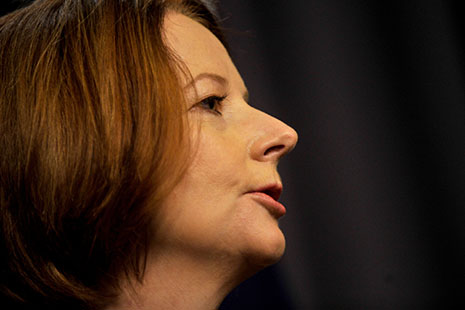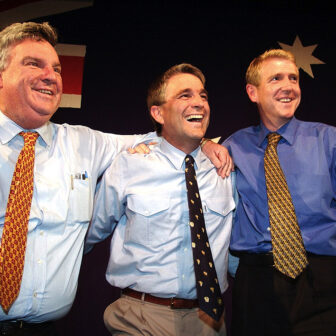IF, as seems likely, the burgeoning scandals surrounding Labor MP Craig Thomson bring down the Gillard government and hand power to Tony Abbott, it will be a most unfortunate and undeserved end to the best government Australia has had in twenty years, but an outcome for which the Labor Party has only itself to blame.
The disproportionate role played by unions in the preselection process, and the preselection process itself, need to be revisited in light of the potential disaster looming as a result of a single injudicious preselection that was entirely avoidable.
Some of the allegations relating to use of a union credit card by Mr Thomson were already known to the party before the 2010 election, having been aired during a bitter union election campaign in the Health Services Union. There was ample opportunity for the party to investigate the allegations and satisfy itself that Mr Thomson was not a ticking time bomb. But, no, he was re-endorsed and subsequently re-elected.
This raises serious questions. Were the allegations ever investigated? If so, by whom and what was the outcome? If not, why not? Or was factional muscle brought to bear to keep a lid on the whole sordid affair? Can the electorate have confidence in the candidates selected and in the process used to select them?
Mr Thomson, it needs to be said, comes out of the NSW branch of the Labor Party, which – until it was decisively rejected by the voters in March – presided over the most inept, accident-prone and possibly corrupt administration the nation has ever seen (with the possible exception of the Bjelke-Petersen government in Queensland).
The very real dilemma for the prime minister, embattled as she is, is that she has had no politically realistic alternative to supporting the Member for Dobell, given the precarious numbers in parliament; but the longer the issue drags on, and the murkier it seems to get day by day, the more she and the government will suffer in the unforgiving court of public opinion.
Mr Thomson’s position is untenable, and by logical extension, so might be that of the government, whose very existence is tied to his fate. Whether Ms Gillard cuts him loose or he falls on his sword is irrelevant: a resignation, a by-election in a seat with a 5.1 per cent margin, and an inevitable Liberal victory are all lining up, potentially putting paid to the Labor era – which would end not with a bang, as in 1975, but rather with a pathetic and utterly sordid whimper.
A Liberal win in Dobell would mean a lower house made up of seventy-four Coalition MPs, seventy-one Labor, four independents and one Green. In a vote of no-confidence, independent Bob Katter will vote with the Coalition while Labor will be able to muster seventy (the Speaker excluded, as he does not have a vote in a division unless the vote is tied, in which case he exercises a casting vote) plus at most four others, making it seventy-five Coalition against seventy-four Labor. (It is uncertain whether the independents will support the government under the circumstances, but it matters not.) The government’s fate would be sealed. The most likely course of events from that point would be an election, as Mr Abbott would have difficulty governing after providing a Speaker, especially given the fact that a confidence vote requires more than half the members to succeed. With the state of the polls, the outcome of any election is a total no-brainer.
Tony Abbott is fond of calling this the worst government in history, but then he also believes in miracles. Under difficult circumstances, Labor has taken the bold step of addressing climate change, which is well and truly with us, but the opposition’s political opportunism has turned this boldness into a millstone. The government, for its part, has been far too modest in drawing attention to its successes.
History tells us that we respond more to no than to yes. Of the forty-four referendums since 1901, the mere eight that resulted in the affirmative were ones that enjoyed a rare bipartisan consensus. As long as there was a “no” voice, the people responded in the negative.
The broadband network is another bold step, harking back to nation-building of old when political leaders dared to dream, building the transcontinental railway, the Sydney Opera House and the Sydney Harbour Bridge and establishing enduring and vital institutions such as the ABC, the National Library and the Australian National University.
Labor has also shown commendable courage in taking on the powerful tobacco industry by bringing in some of the world’s most stringent packaging legislation and in daring to push the lucrative mining industry, more than 80 per cent foreign-owned, to leave some of its profits in Australia.
Perhaps more than anything else, the handling of the global financial crisis was both deft and effective, sparing the Australian much misery, and making our economic management the envy of the world.
Tony Abbott and his team have shown little in the way of policy development to inspire confidence. Mr Abbott’s knee-jerk policy pronouncements, often reversed or highly qualified in twenty-four hours – most recently his siding with farmers against the coal-seam gas industry – are chaotic in the extreme and the public service will be hard-pressed to give structure to such anarchy. And with the foreshadowed job cuts to the bureaucracy, there will be far fewer of them around to help out when they might most be needed.
The Rudd and Gillard ministries have, in general, been sound and talented. It is doubtful that an Abbott front bench will come anywhere near Labor in terms of calibre. Wayne Swan has been the hard man of government in a role that it is difficult to imagine Joe Hockey taking. Stephen Smith has handled defence and foreign affairs with a flair and skill that is unlikely to be emulated by David Johnston and Julie Bishop. The one Coalition frontbencher with policy nous and political smarts, Andrew Robb, might find himself both lonely and isolated.
And we come back to the Labor Party, which is about to enter one of its darkest periods for decades, having been savagely belted in New South Wales in March, where it is likely to be out of power for many years to come, and voted out of office in Victoria last year. Looming defeats in Queensland, South Australia and Tasmania paint a most dismal picture, and we have to ask why.
It is not an easy question to answer, and Labor’s hand-wringing over its near-death experience in 2010 has yielded little illumination. Political ineptness of an extraordinarily high order cost it government in New South Wales; in Victoria a competent yet insensitive government stood by as its support slowly ebbed away; Queensland, South Australia and Tasmania are similar, though each has different elements of political incompetence that just might have been averted or minimised with a more broadly based and wiser candidate selection.
Labor, for all its achievements, occupies a house much in need of order. Rebuilding rather than renovation will be required, and that will entail a process akin to civil war. But as Julia Gillard will be likely, it seems, to find out soon, the costs of not doing anything are exorbitant. •
Norman Abjorensen teaches public policy in the Crawford School of Economics and Government at ANU. He is co-author of Australia: The State of Democracy.




